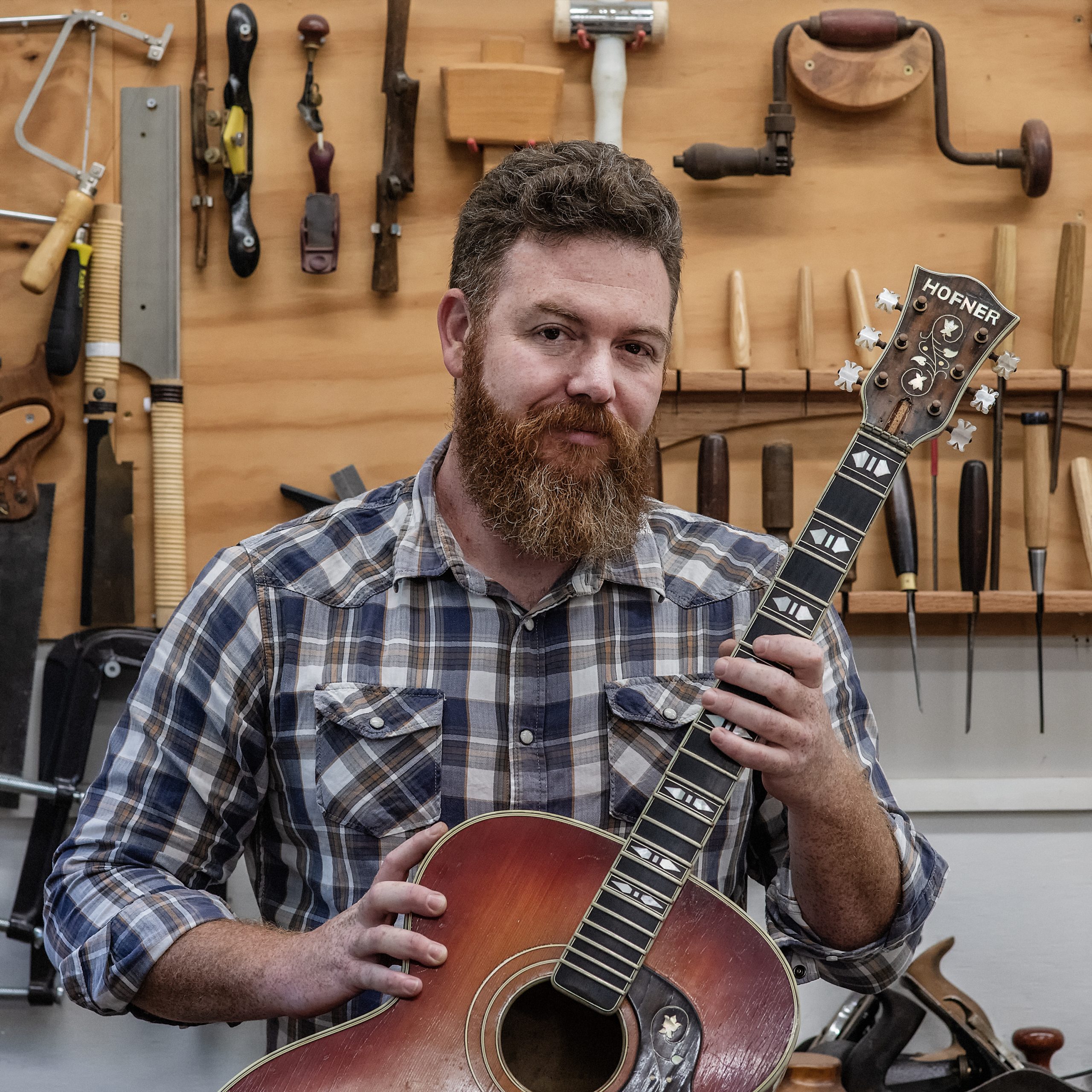
Digby Hildreth tunes in with Josh Rippingale of Federal Strings to learn more about crafting and caring for stringed musical instruments.
Josh Rippingale became obsessed with guitars around the age of eight, growing up in Federal and being “force-fed” early North American folk, country and blues music by his father.
That kind of finger-picking still excites him, he says, and guitars are now the focus of his working life as a luthier – someone who builds and repairs fretted instruments. That’s mainly acoustic guitars in Josh’s case, but also banjos, ukes, basses and the occasional harp or dulcimer, though so far no lutes – the instrument that gave his craft its name.
“Guitars are the only thing I’ve encountered in my life that I’m incapable of being bored by,” he says. “Everything else that I’ve had an interest in, I’ve moved on from.”
Aged 17, Josh went to Brisbane to study journalism, then worked for the ABC for 12 years. He spent all his spare time as a “hired gun” for other artists and playing with various “scrappy pub rock or blues bands – none worth naming”.
He started doing his own repair work, then his bandmates’, then took to buying “clapped out” old guitars to disassemble and put back together, honing his technical skills and amassing “a two-car garage full” of specialist tools and equipment.
Wanting to fabricate his own guitar but after half-a-dozen attempts realising he had no idea what he was doing, he went south to study with revered guitar builder Gerard Gilet. It was an “incredible experience”, Josh says, both from the perspective of seeing a master of the craft at work and coming to understand the commercial realities.
Studying with Gilet made him see that what had been a side-hustle was something needing his full-time attention. It also gave him a holistic sense of what was required to combine the two qualities of building an instrument: the aesthetic and the mechanical.
First, you need the woodworking chops to bend the timber, do the inlay, have it all look as neat and tidy and as aesthetic as you can, he says.
“At another level, the guitar is a machine that is required to function within a very specific and finite set of parameters in order to work as a viable high-grade musical instrument.”
The precision geometry needed is insanely precise, but without this the guitar cannot fulfil its primary purpose – to be functional.
Learning how the aesthetics and the mechanics work hand in hand was what took things to the next level, he says.
When he believed he could offer a professional level of service, he returned to his birthplace and set up Federal Strings, in a workshop within sight of the shed where he and a mate had practised as teenagers.
Maintenance work as a luthier is multifacetted: Josh repairs traumatic injuries, restores old instruments with failed joints, “fettles” worn fretwork, nuts and saddles.
But the word “repair” is a misnomer, he says. “It’s more about keeping guitars healthy and playing well – including how their owner wants them to sound.
“One of the most enjoyable parts of the job is meeting people, hearing their story — and the instrument’s story — and going to work and getting the guitar in as good a condition as it can be for that particular player.”
Sometimes he is tasked to restore an instrument that has sentimental value only, and some guitars have an emotional resonance for him, too.
“They have periods of life; they age, need care and attention, and in many cases don’t last forever. Steel string guitars, especially, tend to have a finite lifetime. And that’s bitter-sweet.
“Every guitar is unique, he says. “Even if the timber used is from the same tree, there will be differences. I guess that is part of their mystery … and what attracts me to them.”
While he really likes a lot of Australian timbers for guitar-making he is also acutely aware of the environmental context, and committed to ethical sourcing.
Hardwood is required for the back and sides, while the top – or soundboard – is traditionally a soft wood. He favours Queensland maple for necks because “it carves beautifully and is incredibly stable” and he can source it from a sustainable plantation.
For the top he mainly uses spruce, especially ethically harvested storm-downed trees.
Recently he has made backs and sides out of camphor laurel: “It’s plentiful and often removed as a pest. But it’s an incredible wood and is totally viable.”
The days of gigging are long gone, Josh says, but after a long day in the workshop and an evening with his young children, he still sits down every night to play, rejoicing in producing the music he heard at his own father’s knee – Big Bill Broonzy, the Reverend Gary Davis and the like.
Photo: Lyn McCarthy – Niche Pictures